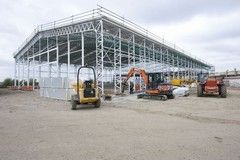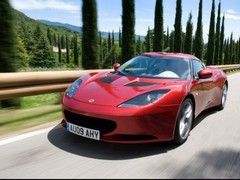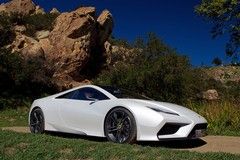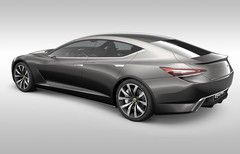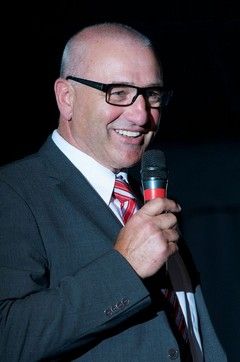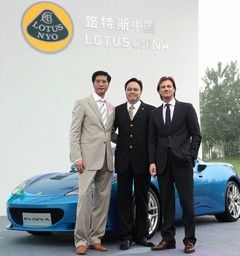The Lotus Five Year Plan - One Year In
Bahar's team keep it 'pedal to the metal' in spite of critics
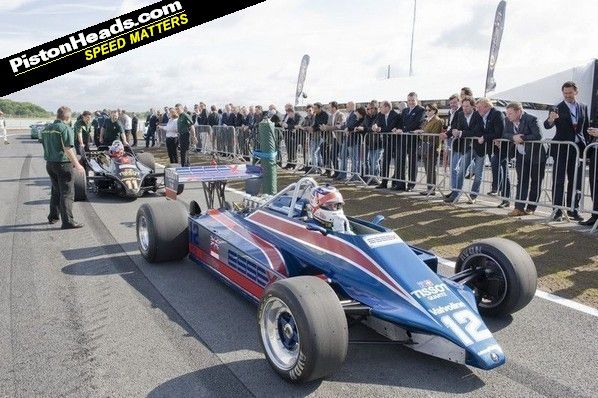
Nigel Mansell in the Lotus 81 - a big draw for media at this week's test track opening
The first few minutes were a little uncomfortable as Bahar began his presentation with what sounded like a plea for the media to get on board with the company's five year plan. Sources suggest the controversial Lotus chief doesn't understand the cynicism (especially from 'enthusiasts' here within the UK) about a programme designed to bring jobs and wealth to the country and to turn around one of our most historic (remaining) marques. Nevertheless he gamely confronted the issue, and didn't try to sweep it under the carpet.
"We're 17 months into our five year plan, and obviously we realise there have been negative and cynical comments in the media and elsewhere, but it isn't stopping us from delivering our ambitious - or as some would say over ambitious - plan," he said.
Acknowledging the fact that a £3m track refurbishment is a small step along the road, Bahar reckons it is proof that things are getting done. Look at the building work going on around the site too, he said, while confirming all the targets for the first year have been met.
Bahar also invoked the names of the Lotus Advisory Council - containing industry luminaries Burkhard Goschel, Frank Tuch, Bob Lutz and Tom Purves - and talked up the credibility they bring to the project. "People like this wouldn't be taking part if this plan wasn't credible," he claimed. "If we the management team fail, well, we can look for another job. But with their reputations these people have even more to lose than us."
Proton's MD Dato' Sri Syed Zainal attended the briefing and added a few words confirming the commitment to the project from the Malaysian end. "As a shareholder in a company we've owned for 14 years, we know there's a lot of capability to unlock - the value of this company is in its future," he stated.
Keeping the faith
Speaking to Dany Bahar after his presentation, we asked him about his own self belief. Did he ever have any doubts about the size and scope of the programme?
"Yes of course I have doubts every day," he told us. "It's a plan, but it's also a gamble. It's not easy to raise £400 million investment for a company that's been losing money for 15 years," he added wryly, but he says he draws confidence from where the money has been sourced. The detailed auditing from state-owned Proton has been far tougher at every stage than it would have been if the money had come from investment banks, Bahar maintains.
The CEO also reiterated the value of the Lotus Advisory Council, which meets four times a year as a group, although members make significant individual contributions beyond that - in exchange for little more than an Evora loan car and travel expenses. Former BMW R&D guru Burkhard Goschel was responsible for a complete rethink on the transmission, says Bahar, who reckons the Council's combined experience is priceless. "We're a young team, but between them these guys have probably a hundred and fifty years of experience, including with turnarounds that have been successes and failures. We brought them in because we didn't want to miss anything."
PH spoke later to Council member Tom Purves about his role, and he demurred from the suggestion that his reputation rested on the Lotus Plan's success or failure, but he did agree the relationships are fuelled by goodwill and enthusiasm.
"No I don't think our reputations are tied to this. From our point of view, Lotus is just far too important a brand to see go to the wall, and to be part of trying to make this work is a pleasure," he told us.
A moveable feast
The Lotus Plan itself has evolved slightly since its high profile launch at the Paris show last Autumn. Most significantly the plan to use a Toyota/Lexus V8 has been dropped following market research, from which Lotus was surprised to learn that customers didn't think a Toyota powered car could justify a £100k+ price tag.
Of 2,000 respondents, we're told only a third were existing Lotus customers - which perhaps explains the nature of the feedback - but either way the research means Lotus is now on the way to getting its own 'in-house' modular engine, initially in 4.8 litre V8 guise in the new Esprit. The Elan has been delayed because it looked too much like an in-house Esprit rival, and it could now reappear as an Evora replacement in 2017 (thus putting it safely outside the remit of the £400m/5 year planned investment), while there's still thinking to be done on the future of the Elise, according to Zimmerman: "The current car is very track focused with its wide sill structure, and we're still thinking about where the next one should go."
Part of the Elise equation could be a 2.0 or 2.4 litre in-line four based on the new modular V8, if the cost can be amortised. But in whatever shape the new Elise is realised, Bahar continues to affirm his commitment to those core Lotus enthusiasts at the sub-£30k end of the sports car market.
The rest of the model plan, while appearing grandiose from an external perspective, is actually predicated on what Bahar describes as conservative planning: "We are not a Ferrari or an Aston, and that's why we need such a wide product range so we don't miss any opportunities. If we had the confidence to say we could sell 3000 or more Esprits, then we wouldn't need these extra models to succeed. But because we are conservative, and say we'll have only 1500 Esprit sales, this gives us the opportunity to do the front engined GT and a four door.
"Our current volume is around 1200-1800 per car, and the basic assumption for the five year plan is that we can repeat this volume but with more products to reach a target of 5-6 thousand cars a year." Development cost for each will average around £150m (more for the Esprit donor, less for its family spin-offs), he says, so revenue from early Esprit sales will evidently be critical to maintain the plan's progress.
With only £400m to play with, the key to success is 'commonality' across the model platforms, and Zimmermann was at pains to stress the lengths Lotus is going to in this area: "On the one hand it's a pain in the arse doing so many cars at once," he quipped, "it means we're doing 15 hour days - even more. But of course there are many advantages."
"The Elite, Esprit and Eterne are players in a different league to what we're doing today. The new platform and chassis strategy is based around 50 percent commonality of parts, including engine, steering, suspension, brakes and electrical systems," he says, and is confident the newcomers will be worthy contenders in a formidable premium sector.
"The Elite GT will be one of our nicest cars in future, offering usable rear seats in a wheelbase package of 2700mm, a front mounted V8 and 7 speed DCT rear transaxle. The Eterne four door will be Elite up to the central H point, but the rest of the car will new. It will be 400mm longer than the Elite, and launched in 2015."
According to Zimmermann efficiencies are not brought about simply through component sharing, but through the work practices at Lotus. "This is not the normal road car development process," says the former M-B AMG man. "It's more like racing car development. Two people can meet in the morning, make a decision in 30 minutes, and when the memo goes out the next morning everyone is working in the right direction. In a normal car company, these decisions take months."
Wise council?
While the trials of simultaneously engineering a quiver of new models would put any small automotive player under extreme pressure, how does Council member Purves react to the assertion that - given sufficient funds - developing the product may be the easy part?
"Everything I've seen of planning they've done appears founded on realistic market assumptions about wealth and population growth, and future propensity to purchase. You've already got Ferrari and Lamborghini who produce cars of the nature we're talking about. Ferrari has become quite ambitious in terms of scale, and Porsche has gone mainstream. So there's quite a gap developing for knowledgeable people looking for enthusiasm and excitement."
"In my view the bigger challenge is to build a dealer network that can deliver," he says. "That's about hearts, minds and attitudes, and it's not just something you can pour money into."
This view is echoed by Kalbfell: "When I arrived somebody told me Lotus was always a technology focused company. Now the major task is marketing, and getting on the shopping lists of many more customers - so expect a lot of sales, marketing and point of sales activity. Lotus faces the painful process of connecting the business to future needs."
Bahar himself is aware that the right product line-up is only half the story, and while corporate communications currently still revolve around the cars, the process of firing up a sleepy dealer network has begun in earnest behind the scenes with a dealer conference at Hethel held earlier in the week.
"We've offered our dealers the chance to grow with us. They don't have to invest much now, but if they want to be part of the Esprit success - with its much bigger margins - of course some investment will be required," says Bahar.
"Some will not be able to grow with us and some will, but today out of our 160 dealers only a handful report they are breaking even, so it's really a question of whether they want to make money with Lotus. Here in the UK there are 14 or 15 dealers, and there'll probably be a similar number in five years but with a very different set-up."
Expanding global markets will also form part of the recipe. "The Asian market is fastest growing for sure. Japan is very strong, and even the recent tragedy hasn't impacted - although we keep waiting for an effect," he says. "We have just introduced a new China distributor who sold 120 cars in the three weeks before he even started working properly."
Encouraging stuff for a man who, in spite of the colourful commentary his plans have generated, is the first to acknowledge: "We have to win this on the sales floor".
Gassing Station | General Gassing | Top of Page | What's New | My Stuff


